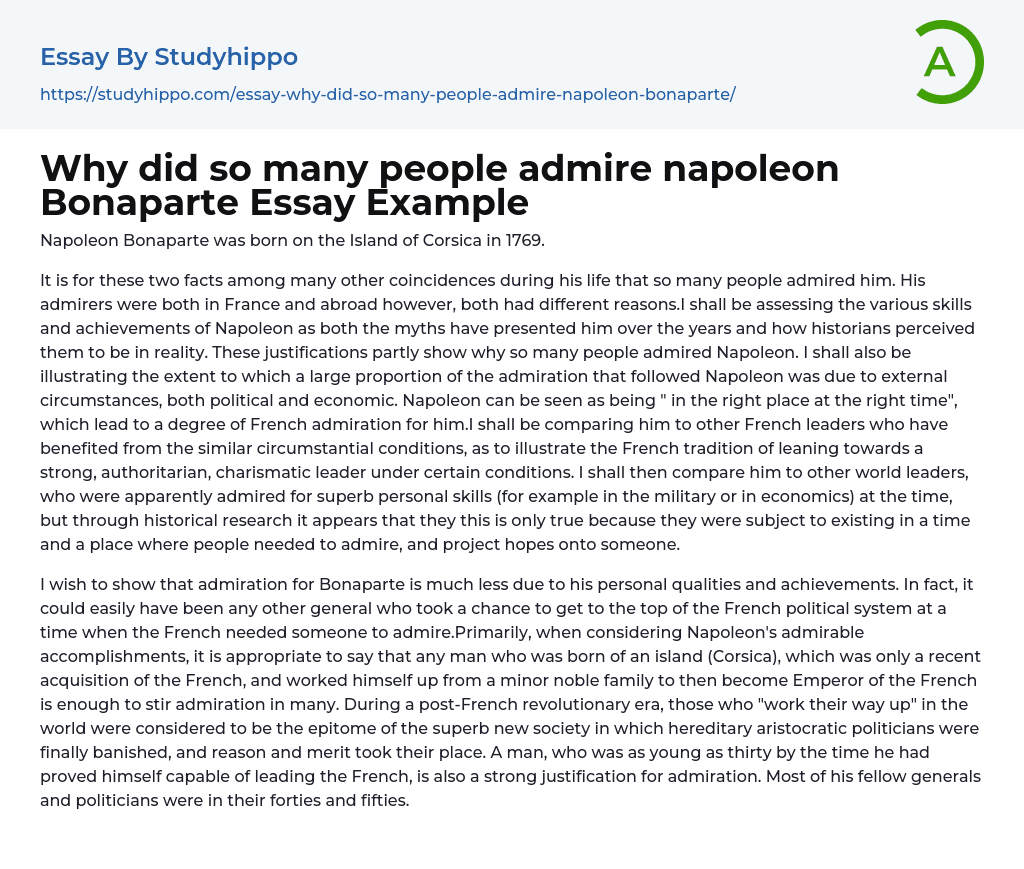Napoleon Bonaparte was born on the Island of Corsica in 1769.
It is for these two facts among many other coincidences during his life that so many people admired him. His admirers were both in France and abroad however, both had different reasons.I shall be assessing the various skills and achievements of Napoleon as both the myths have presented him over the years and how historians perceived them to be in reality. These justifications partly show why so many people admired Napoleon. I shall also be illustrating the extent to which a large proportion of the admiration that followed Napoleon was due to external circumstances, both political and economic. Napoleon can be seen as being " in the right place at the right time", which lead to a degree of French admiration for him.I shall be comparing hi
...m to other French leaders who have benefited from the similar circumstantial conditions, as to illustrate the French tradition of leaning towards a strong, authoritarian, charismatic leader under certain conditions. I shall then compare him to other world leaders, who were apparently admired for superb personal skills (for example in the military or in economics) at the time, but through historical research it appears that they this is only true because they were subject to existing in a time and a place where people needed to admire, and project hopes onto someone.
I wish to show that admiration for Bonaparte is much less due to his personal qualities and achievements. In fact, it could easily have been any other general who took a chance to get to the top of the French political system at a time whe
the French needed someone to admire.Primarily, when considering Napoleon's admirable accomplishments, it is appropriate to say that any man who was born of an island (Corsica), which was only a recent acquisition of the French, and worked himself up from a minor noble family to then become Emperor of the French is enough to stir admiration in many. During a post-French revolutionary era, those who "work their way up" in the world were considered to be the epitome of the superb new society in which hereditary aristocratic politicians were finally banished, and reason and merit took their place. A man, who was as young as thirty by the time he had proved himself capable of leading the French, is also a strong justification for admiration. Most of his fellow generals and politicians were in their forties and fifties.
- Berlin essays
- Pompeii essays
- Paris essays
- Athens essays
- Belgium essays
- England essays
- Germany essays
- Greece essays
- Ireland essays
- Italy essays
- London essays
- Russia essays
- Spain essays
- United Kingdom essays
- Great britain essays
- Rome essays
- British essays
- Birmingham essays
- Afghanistan essays
- Africa essays
- America essays
- Asia essays
- Australia essays
- Caribbean essays
- City essays
- Developing Country essays
- Dubai essays
- Earthquake essays
- Europe essays
- Fracking essays
- Georgia essays
- Middle East essays
- Natural Disaster essays
- New Zealand essays
- North Korea essays
- South Korea essays
- Thailand essays
- Travel essays
- Ben jonson essays
- Billy elliot essays
- Dred Scott essays
- Frederick Douglass essays
- Geert Hofstede essays
- George Eliot essays
- Ginevra King essays
- Harriet Tubman essays
- John Keats essays
- John Proctor essays
- Joseph Stalin essays
- Mahatma Gandhi essays




